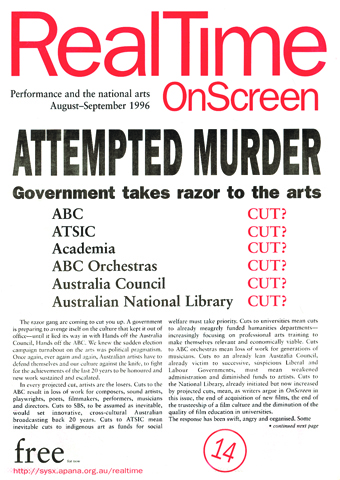Abbott claws back the past
Keith Gallasch
Cover for RT14 – click for larger version
Our RealTime 14 cover anticipated the worst from then Prime Minister John Howard’s Liberal-National Coalition Government Budget of August 1996. It was a shocker, from the closure of the Commonwealth Dental Program (resulting in a consequent decline in the nation’s dental health) to a cut of $470 million from the Aboriginal and Torres Strait Islander Commission (ATSIC) budget, forcing it to close community, cultural ($40m) and youth support programs as well as women’s centres.
Ultimately the Howard Government’s treatment of the arts wasn’t as destructive as anticipated, but for most artists funding levels remained stagnant. The Government was censorious and an Arts Minister side-stepped the Australia Council’s peer assessment requirements to directly fund the Melba Foundation at $1m per annum—this was withdrawn by the Gillard Labor Government in 2012. Worse, there was no vision for the future of the arts in Australia, not until Labor Arts Minister Simon Crean led with Creative Australia—The National Cultural Policy in 2013 with funding promises of $236m over four years including $75m to the Australia Council.
Over four years the Abbott-Hockey budget will cut $30m from the Australia Council, $25m from Screen Australia ($38m with other program losses) and $33.8m of Ministerial cultural programs. Prime Minister Tony Abbott declared, “[Arts Minister George Brandis] has very substantially protected arts funding generally—and literary funding in particular—from the stringencies of these times and in so doing has made himself deeply unpopular with all his colleagues.”
Australia Council CEO Tony Grybowsky told the ABC that this will mean “smaller and fewer” grants to individual artists and cuts to small companies, as directed in the budget [ie grants not forward-committed as in the case of triennial funding]. “[Grybowsky] was relieved that funding for the 28 major performing arts companies would be maintained” (abc.net.au). Already poor artists will now face the government’s stringent new welfare measures.
Howard was not unfavourable to the arts, but we can’t expect the same of Tony Abbott. His first budget signals a revival of the culture wars of the 90s but with a much more comprehensive agenda and much larger view of culture in which science (cuts to the CSIRO and a vengeful dismantling of environmental agencies) and the democratic right to education (the execution of a calculatedy elitist strategy) have been targeted for weakening.
The past has come back with added bite.
Keith Gallasch
RealTime issue #121 June-July 2014 pg. 15







